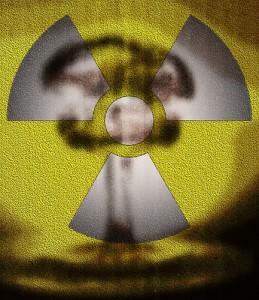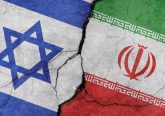
In a recent interview with The Diplomat, Professor Kenneth Waltz discussed the advantages of Iran acquiring nuclear weapons.
An eminent and lucid scholar, Waltz committed the error of trying to fit an incorrect piece of a puzzle into a coherent theory.
His theory whereby nuclear powers have never gone to war against each other has, so far, proven to be right. However, trying to extend this fact in a mechanical manner into a future scenario involving Iran is questionable.
To begin with, the leadership of Iran, as distinct from that of any other of the current nuclear powers, has called for the destruction of its enemy as a sovereign entity. It has made it clear, time and again, that its aim is to see Israel destroyed. Further, it has gone so far as to engage in virulent anti-Semitic rhetoric reminiscent of Nazi ideology. The latest statements made by Iran’s president and vice president at a United Nations Conference provide clear testimony to that, along with the fact that it is one of the few countries that denies the Holocaust.
Waltz ascribes to the Iranian leadership the same kind of decision-making logic with regard to Israel as he does to the other nuclear powers concerning their rivals or enemies. He seems to imply that the benefit versus cost equation applies in the same manner in all cases.
He may be right. However, considering the clear aims of Iran’s leaders and the ideological motivation behind them, he asks Israel and all other powers interested in stability in the region to risk more than is prudently warranted.
Further, even if one were to believe that Iran’s leaders can be deterred, a nuclear Iran would be, contrary to what Waltz argues, a more self-assured revolutionary power in the region.
It will feel less, rather than more, constrained to incite its allies against Israel and any other country in the region. After all, even according to Waltz’s own theory, Israel would never use its nuclear weapons against Iran even if Hezbollah or any of Iran’s other allies repeatedly attacked it. Why should a nuclear Iran be less willing to engage even more vigorously in supporting proxy attacks than it does at present? Iran’s immunity would be enhanced as the costs of attacking it are perceived to increase.
Waltz seems to be incredulous that Israel should continue to be the only nuclear state in the Middle East. How can one fathom such a scenario? A nuclear Iran appears to him to be a solution to a problem that does not exist. After all, even if Israel does possess nuclear weapons, the fact remains that it is the only country on the planet that has been threatened with its very existence. Nuclear weapons are an insurance policy against destruction.
For Israel, possessing nuclear weapons is not aimed simply at deterring an attack, but rather at avoiding its destruction. A nuclear Iran would only make this truth even more evident.
Dr. Yoav J. Tenembaum lectures at the Diplomacy Programme (Political Science Department) at Tel Aviv University. He holds a doctorate in Modern History from Oxford University and a master’s degree in International Relations from Cambridge University.
This post first appeared on the website of the Georgetown Journal of International Affairs. It is reposted here with the permission of the author.






3 Comments
Once again I found myself in disagreement with your argument. I am aware of Waltz article and I must say that the logic of your piece does not differ much from that of Bibi, stressing aspects of the Iranian leadership and foreign policy priorities which are notoriously ‘a make-up’, rhetorical rather than strategic.
Those who work on Iranian foreign policy from a non-ideological nemesis, tend to agree that call for the destruction of Israel are evidently linguistic devices by the leadership and not a policy matter. Iran’s leadership is focused on the maintanance of its regional influence in the region, in a bid to achieve the status of an acknowledge regional super-power. It does not seek any major confrontation with Israel, because it is aware of US military supremacy vis a vis Iran.
If Iran was to develop a nuclear bomb, it would be most certainty a defensive device, to deter the continuous and often very realistic threats by Israel and its international supports. After all, if there is any country in the region which has been clearly under the threat of almost constant war, that is Iran, and not Israel. And a well-known background of foreign interference and foreign interventions on its soil, enhances this understanding.
Those who emphasis Ahmadinejad’s populist and unacceptable rhetoric, are (or play so) unaware of his progressive marginalization within the Iranian power elite; he is unlikely to have any significant influence on the decision-making on the nuclear issue.
26 August, 2012
Thank you for your comments about my article.
Let me, briefly, just refer to the most striking comments you advance:
1. You claim that the consistent call to destroy Israel, and the anti-Semitic remarks by the Iranian leadership, is mere rhetoric. On what basis do you claim that? Where is the proof for what you write?
2. You claim that Iran’s leadership is focused on the maintenance of its regional influence and strives to achieve the status of an acknowledged regional power. Why should there be an inherent contradiction between that and a sincere desire to see Israel destroyed as a sovereign state? Why should there be an inherent contradiction between that and a pathological hatred of Israel and the Jewish people, as clearly expressed both by Iran’s President and Vice President only recently?
3. You argue that if Iran were to develop a nuclear bomb it would most certainly be a defensive device. Well, even if you are right, the leverage it would afford it to destabilize further the Middle East and encourage every actor in the region bent on Israel’s destruction would be enhanced, and not reduced as Waltz contends. Indeed, Iran with nuclear weapons would further interfere in the internal affairs of Arab countries in the region and support every effort to derail the peace process between Israel and its Arab neighbours. Why do I claim this? Because, without nuclear weapons, Iran has been trying to achieve the aforementioned. Why should it desist from continuing to pursue the same policies once it has the insurance policy of a nuclear weapon behind it? Is it a coincidence that the Arab world, with the sole exception of the Assad regime, is weary of a nuclear Iran?
4. Your reference to Iran as the country most threatened in the region is peculiar, to say the least. In order to secure its soil and sovereignty Iran does not need to support Hizbullah, Hamas, Islamic Jihad and constantly call for Israel’s destruction. Iran does not need to officially deny the Holocaust or engage in anti-Semitic insults of the worst kind. That can hardly be seen as a defensive policy. No country in the world calls for the destruction of Iran as a sovereign state. Iran is the only country that calls for the destruction of another sovereign state. That can hardly be seen as a defensive device aimed at protecting its own independence.
Yoav
Thank you for your detailed answer;
I will try to be schematic, by answering per points.
1. The Iranian leadership supports a ‘one-state solution’ as long as the Palestinians do not agree on an alternative project. This is Iran’s official policy on the Israeli-Palestine conflict; in the meantime, the leadership has been calling for the eradication of the State of Israel and the creation of an independent Palestinian State. This has happened for more than 30 years and has become part of the symbolism of the Iranian propaganda. But Iran has not taken any direct action which threatens Israel’s existence; as Israel supports anti-Iranian groups (Jundullah, MEK), Iran does the same with Islamic Jihad and Hamas. Hizbullah is different, and I will come to it later.
The presidential entourage’s anti-Semitic remarks (Holocaust denial) are a minority within the Iranian establishment, and did not materialise in a threat to the Iranian Jewish community. Thus, they are rhetoric, which unfortunately has been appealing in large parts of the ‘Arab street’.
2. You depict Iran as an irrational player, whereas the reality on the international arena suggests that it has acted as a rational player over more than three decades. Iran won’t destroy Israel by military means, because it would face its own destruction, if not by Israel’s second-strike capacity, by a US intervention. One must suffer from Irano-phobia in order to reduce Iran’s foreign policy to Ahmadinejad’s remarks. And unfortunately, Irano-phobia is a sentiment in surge towards Iran and Iranians, mainly because of an erroneous and often extremely biased reporting of the news.
3. The Arab-Israeli peace process was not derailed by Iran, but rather by Israel’s unwillingness to come to terms with its neighbours. Iran has of course put pressure on the process, as much as other international forces did.
I do not deny that a nuclear Iran would weaken Israel’s position in the Middle East; in fact, Israel’s weakening would constrain the Israel establishment to come to terms with its neighbours, and perhaps to achieve an inclusive peace process.
It would endanger the Gulf monarchies, but it is likely that they will come to terms on a regional basis, rather than the current destabilised pattern of relations. All of this would depend on the willingness by the US to accept Iran as a strategic player in the region. So far this did not happen, mainly because of the Israeli lobby’s pressure. I hope you won’t disagree on the incredible impact of AIPAC and CO. on US foreign policy, particularly vis a vis Iran and the ME.
4. Israel has threatened Iran for more than two decades, in often very concrete terms, calling for imminent military actions. Iran never did so, and this makes the Israeli threat to Iran very much a matter of concern. Israel plans to bomb Iranian nuclear reactors, with no interest in the consequences of such an action for the population. Dangerous Radiations and contamination would be a major side-effect, but no major media mention them. That is why an Iranian bomb would be defensive, ie to avoid military escalation. It would of course enhance Iran’s influence in the region.
As for Hizbollah, we must look at it not as a mere proxy element of the Iranian chessboard. It is a Lebanese political entity with popular support. It has financial support from a wide range of sources and internal legitimacy.
All in all, I think the main mistake is represented by your definition of Iran as a non-rational entity.
When one looks at the last three decades, Iran has not invaded any country, has not staged any military attack to its neighbours, has not disrupted the flow of goods and oil in the Persian Gulf, has cooperated with international forces during period of crisis (Kuwait 91; Afghanistan 2001…). Its rhetoric must be blamed, especially when explicitly anti-Semitic; nonetheless, it is also true that Israel and the US have used this excuse to justify all sort of actions against Iran, without looking at the reality of the region.
Best,
Maziyar